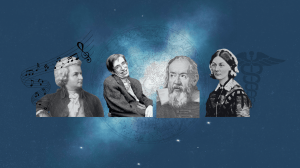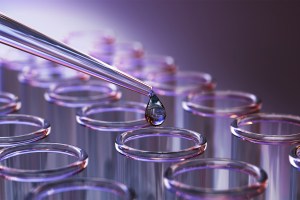Tag: Neurology
-
Health
Stages of memory described in study
“To initiate a memory is almost like creating a word processing file on a computer,” explains researcher Matthew Walker, instructor of psychiatry at Beth Israel Deaconess Medical Center and Harvard…
-
Health
Early molecule fingered as an Alzheimer’s cause
“The way we look at it, Alzheimer’s disease is really cancer of the brain,” says Rachael Neve, Harvard Medical School associate professor of psychiatry at McLean Hospital. “But neurons cannot…
-
Health
Risk of stroke from obesity is now measurable
While it has been suspected for some time that being overweight could potentially increase a person’s chances of a stroke, a study published in the Dec. 9, 2002, issue of…
-
Health
Stem cells reduce brain damage
Mice with the kind of brain damage caused by strokes or cerebral palsy received implants of stem cells that resulted in the spontaneous replacement of many of the missing cells,…
-
Health
Starship memories
Psychologists are at odds over the idea that people can forget traumatic events then “recover” intact memories of the trauma years later. On one side are clinicians, who observe that painful memories can be repressed, banished from a trauma survivor’s consciousness until they’re “recovered” with the help of certain psychotherapeutic techniques in adulthood. Memory researchers,…
-
Health
Protector protein part of nerve cell defense
Heat shock proteins are known to protect all cell types from various general assaults. They were originally discovered when cultured cells that were heated expressed the proteins at high levels…
-
Health
Genes found that regulate brain size
A gene that builds bigger brains, called beta-catenin, was discovered in the laboratory of Christopher A. Walsh, Bullard Professor of Neurology at Harvard Medical School. Researchers there engineered increased activity…
-
Health
Chili peppers and inflammation
Researchers have discovered that the burinng pain of arthritis is similar to the pain associated with eating chili peppers. “The receptor activated by chili peppers in the mouth and other…
-
Health
Alzheimer’s-associated enzyme elevated in key brain areas
A research report that appears in the September 2002 issue of the journal Archives of Neurology may improve understanding of the most common form of Alzheimer’s disease. “Our key finding…
-
Health
Brake on Axon regrowth discovered
Since nerve cell axons in the mature central nervous system do not regrow, neurologists have no way of fully treating paralysis due to injury. “About a hundred years ago, people…
-
Health
Practice makes perfect
Harvard Medical School researchers conducted a study in which people were taught to type a sequence of keys on a computer keyboard as quickly and accurately as possible. A group…
-
Health
Investigators discover method to stimulate brain rewiring after stroke
After a stroke, brain cells die and their connections to other parts of the brain are lost. In a study with rats conducted at Children’s Hospital in Boston, a naturally…
-
Health
Old-line antibiotic seen to save neurons
Developed as an antibiotic 30 years ago, a drug called minocycline was later discovered to ease acne, rheumatoid arthritis, and other inflammatory conditions. A few years ago, it was shown…
-
Health
Science illuminates art
Monet and other painters exploited the parallel visual processing of color and brightness. A sunset seems to shimmer, a field of poppies seems to wave, and a river seems to…
-
Health
Changes in brain shown with learning
Harvard Medical School researchers Vadim Bolshakov, Evgeny Tsvetkov, and Bill Carlezon, based at McLean Hospital, reported with colleagues in the April 11, 2002 issue of the journal Neuron that they…
-
Health
Imagination important for children’s cognitive development
Paul Harris, a professor at Harvard’s Graduate School of Education, says there are two very different ways to define imagination. “You can either see it as disappearing or waning during…
-
Health
Researchers find better way to predict childhood brain tumor outcomes
About 2,000 children a year are diagnosed with medulloblastoma, or brain tumor. In a study, researchers examined gene expression patterns from 99 patient tumor samples of three different types of…
-
Health
Lack of protein ApoE in brain may raise Alzheimer’s risk
Brain cells are protected from possible contamination by substances in circulating blood by what is known as “the blood-brain barrier.” Researchers have many questions about precisely how this protective mechanism…
-
Health
Study adds to the understanding of musical pitch perception
There are differences in the sounds of two voices or two musical instruments even if they hit the same note, and somehow the brain knows that. A new study shows…
-
Health
Pain and pleasure activate same brain structures
David Borsook is a Harvard Medical School associate professor of radiology, who both treats patients and conducts research. “Over 15 years of seeing patients with pain it became obvious that…
-
Health
Lithium drugs found to reduce suicide risk
Researchers who wondered about the effectiveness of lithium drugs in treating patients with severe depression analyzed 22 studies involving 5,647 patients. The scientists, working at Harvard-affiliated McLean Hospital in Belmont,…
-
Health
“Commoner” in brain crowns the cortex
With its role in higher cognitive functions, the cortex represents a significant evolutionary development in mammals, culminating in the enlarged hemispheres of humans and other primates. In the development of…
-
Health
Dopamine may play dual role in Parkinson’s disease
According to the Parkinson’s Disease Foundation, “Parkinson’s disease (PD) is a disorder of the central nervous system that affects between one and one-and-a-half million Americans. Because it is not contagious…
-
Health
Cognition unaffected by marijuana use
Harrison Pope, a Harvard professor of psychiatry, and his colleagues at McLean Hospital, a Harvard-affiliated psychiatric facility in Belmont, Mass., investigated the long-term cognitive effects of smoking marijuana. They recruited…
-
Health
Caffeine linked to protection from Parkinson’s disease
Parkinson’s disease is a progressive nervous disease occurring generally after age 50. It destroys brain cells that produce dopamine and is characterized by muscular tremor, slowing of movement, weakness and…
-
Health
Women’s menstrual cycle holds clue to cocaine response
During the first half of their menstrual cycles, when their estrogen levels are high, women are protected from the brain-damaging effects of cocaine use, according to a research study conducted…
-
Health
Circadian rhythms may distinguish Alzheimer’s disease
Researcher David Harper and his colleagues monitored two key components of the circadian system — the rise and fall of core body temperature and the waxing and waning of spontaneous…
-
Health
Pain promoter plays unexpected role in central nervous system
Despite all the attention it draws in patients, pain has only in recent years been deemed a subject worthy of scientific scrutiny.
-
Health
Rules for music wired into the brain
“Music is in our genes,” says Mark Jude Tramo, a musician, prolific songwriter, and neuroscientist at Harvard Medical School. “Many researchers like myself are trying to understand melody, harmony, rhythm,…
-
Health
Brain hesitates in assembling mosaic of motion
Your brain must integrate information from many different neurons in the primary visual cortex to interpret movement. But how does this complicated process work? Richard Born and Christopher Pack of…


